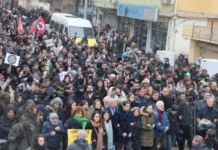Gökhan Ünyeli, an officer in the Turkish military who had been under investigation for alleged links to the Gülen movement and was recently suspended from the service, has died by suicide in Ankara, Turkish Minute reported on Thursday.
Ünyeli took his own life with a pistol near Lake Eymir, 20 kilometers south of Ankara city center, on Wednesday, a day after he found out he was suspended.
The 42-year-old lieutenant colonel, who has been investigated since last year on suspicion of terrorism links due to an unanswered phone call he received 12 years ago, left behind a two-page letter saying that the injustices he faced had “exceeded the limits of tolerance.”
“I have been subjected to humiliating administrative and judicial measures in the past year. I hope no one else experiences what I went through due to an unanswered call on my phone by an unknown person 12 years ago,” Ünyeli said.
He also advised young officers to document their every move and to report unanswered calls on their phones to the prosecutor’s office to avoid experiencing what he went through, underlining that he harbored no resentment towards any of his fellow soldiers.
Ünyeli’s final journey was marked with a military ceremony in Çanakkale.
In addition to his family, the ceremony was attended by the Çanakkale governor, the Çanakkale Strait and Garrison commander, a group of fellow officers and officials from the Turkey Retired Officers Association (TESUD).
Commenting on the development on his X account, lawyer Levent Mazılıgüney said every soldier serving in the Turkish Armed Forces is regarded as a potential terrorism suspect due to these payphone files.
“Unknown caller, unknown conversation and most importantly, no action, yet members of the Turkish Armed Forces are being accused of terrorism! … Generals, aren’t there any leaders among you?! Who can expect those who can’t protect their comrades against this nonsense to protect the country?!” the lawyer added.
Turkish President Recep Tayyip Erdoğan has been targeting followers of the Gülen movement, inspired by Turkish Muslim cleric Fethullah Gülen, since the 2013 corruption investigations, which implicated then-prime minister Erdoğan, his family members and his inner circle.
Dismissing the investigations as a Gülenist coup and conspiracy against his government, Erdoğan designated the movement as a terrorist organization and began to target its members. He intensified the crackdown on the movement following an abortive putsch in 2016 that he accused Gülen of masterminding. Gülen and the movement strongly deny involvement in the coup attempt or any terrorist activity.
The Turkish government responded to the coup attempt by declaring a two-year-long state of emergency during which a series of executive decree-laws saw the summary dismissal of more than 100,000 public sector workers without due process.
The civil servants who were dismissed were also subjected to measures that violated their right to presumption of innocence, such as travel bans and blacklists on the country’s social security database that are visible to all potential private sector employers.
They also were deprived of any effective legal remedy, and their treatment has been described by human rights groups as “civil death.”
There have been many cases of suicide and suspicious deaths among the people who have been investigated, jailed or arrested due to alleged Gülen links.
In addition to the thousands who were jailed, scores of other Gülen movement followers had to flee Turkey to avoid the government crackdown.















